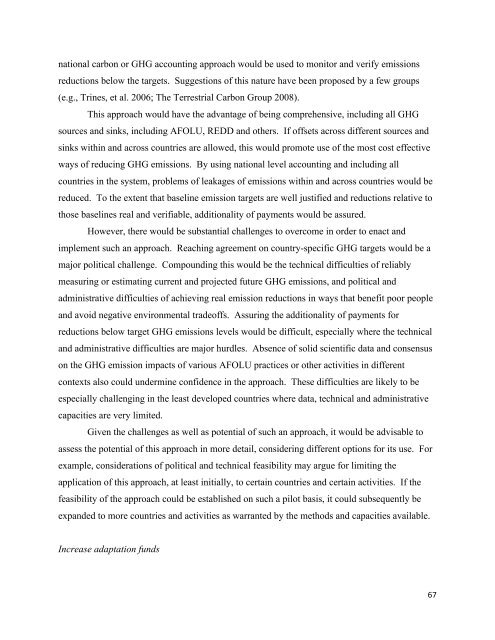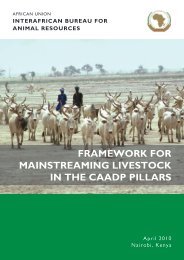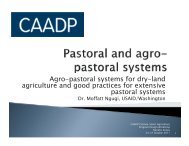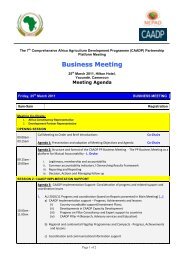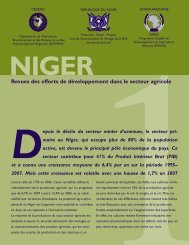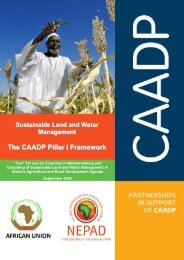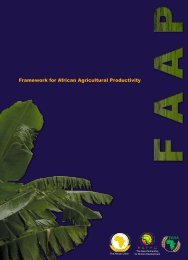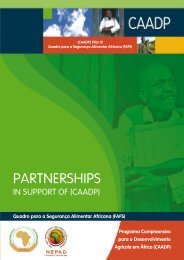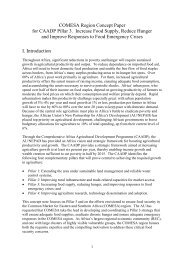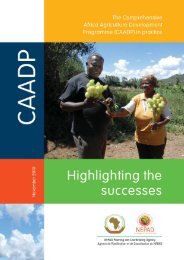The Role of Sustainable Land Management for Climate ... - CAADP
The Role of Sustainable Land Management for Climate ... - CAADP
The Role of Sustainable Land Management for Climate ... - CAADP
Create successful ePaper yourself
Turn your PDF publications into a flip-book with our unique Google optimized e-Paper software.
!<br />
national carbon or GHG accounting approach would be used to monitor and verify emissions<br />
reductions below the targets. Suggestions <strong>of</strong> this nature have been proposed by a few groups<br />
(e.g., Trines, et al. 2006; <strong>The</strong> Terrestrial Carbon Group 2008).<br />
This approach would have the advantage <strong>of</strong> being comprehensive, including all GHG<br />
sources and sinks, including AFOLU, REDD and others. If <strong>of</strong>fsets across different sources and<br />
sinks within and across countries are allowed, this would promote use <strong>of</strong> the most cost effective<br />
ways <strong>of</strong> reducing GHG emissions. By using national level accounting and including all<br />
countries in the system, problems <strong>of</strong> leakages <strong>of</strong> emissions within and across countries would be<br />
reduced. To the extent that baseline emission targets are well justified and reductions relative to<br />
those baselines real and verifiable, additionality <strong>of</strong> payments would be assured.<br />
However, there would be substantial challenges to overcome in order to enact and<br />
implement such an approach. Reaching agreement on country-specific GHG targets would be a<br />
major political challenge. Compounding this would be the technical difficulties <strong>of</strong> reliably<br />
measuring or estimating current and projected future GHG emissions, and political and<br />
administrative difficulties <strong>of</strong> achieving real emission reductions in ways that benefit poor people<br />
and avoid negative environmental trade<strong>of</strong>fs. Assuring the additionality <strong>of</strong> payments <strong>for</strong><br />
reductions below target GHG emissions levels would be difficult, especially where the technical<br />
and administrative difficulties are major hurdles. Absence <strong>of</strong> solid scientific data and consensus<br />
on the GHG emission impacts <strong>of</strong> various AFOLU practices or other activities in different<br />
contexts also could undermine confidence in the approach. <strong>The</strong>se difficulties are likely to be<br />
especially challenging in the least developed countries where data, technical and administrative<br />
capacities are very limited.<br />
Given the challenges as well as potential <strong>of</strong> such an approach, it would be advisable to<br />
assess the potential <strong>of</strong> this approach in more detail, considering different options <strong>for</strong> its use. For<br />
example, considerations <strong>of</strong> political and technical feasibility may argue <strong>for</strong> limiting the<br />
application <strong>of</strong> this approach, at least initially, to certain countries and certain activities. If the<br />
feasibility <strong>of</strong> the approach could be established on such a pilot basis, it could subsequently be<br />
expanded to more countries and activities as warranted by the methods and capacities available.<br />
Increase adaptation funds<br />
!<br />
)*!


